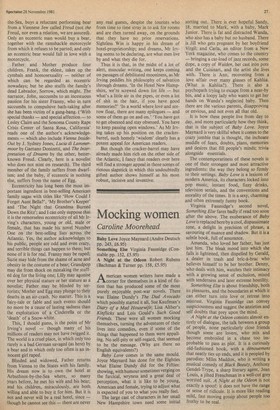Mocking women
Caroline Moorehead
Baby Love Joyce Maynard (Andre Deutsch pp. 243, £6.95) Something Else Virginia Fassnidge (Constable pp. 152, £5.95) A Night at the Odeon Robert Rubens (Bachman & Turner pp. 158, £5.95) American women writers have made a corner for themselves in a kind of fiction that has produced some of the most purely enjoyable post-war novels. There was Elaine Dundy's The Dud Avocado which possibly started it all, Sue Kaufman's Diary of a Mad Housewife; Lisa Alther's Kinj7icks and Lois Gould's Such Good Friends. These were all women mocking themselves, turning the adventures of their lives into comedies, even if some of the things that happened to them were appalling. No self-pity or self-regard, that seemed to be the message. (Why are there no English equivalents?) Baby Love comes in the same mould. Joyce Maynard has done for the Eighties what Elaine Dundy did for the Fifties: showing, with humour sometimes verging on the farcical, wryness and a great deal of perception, what it is like to be young, American and female, trying to adjust what is expected of you to what you really feel. The large cast of characters in her small New Hampshire town need some initial sorting out. There is ever hopeful Sandy, 18; married to Mark, with a baby, Mark Junior. There is fat and distracted Wanda, who also has a baby but no husband. There is Jill who gets pregnant by her boyfriend Virgil; and Carla, an editor from a New York magazine, who comes to the country — bringing a car-load of jazz records, some dope, a copy of Walden, her cast iron pots and the Cuisinart, and the artist she lives with. There is Ann, recovering from a love affair over many glasses of KahlUa.
(What is Kahlaa?). There is also a psychopath trying to escape from a near-by bin, and a loopy lady who wants to get her hands on Wanda's neglected baby. Then there are the various parents, disapproving or envious, and not even all that old.
It is how these people live from day to day, and more particularly how they think, that is the subject of Baby Love. Joyce Maynard is very skilful when it comes to the crazy jumble that is thought, the inchoate muddle of fears, doubts, plans, memories and desires that fill people's minds; trivia alongside essentials.
The contemporariness of these novels is one of their strongest and most attractive ingredients: the way they belong so firmly to their settings. Baby Love is a lexicon of modern America, its characters locked into pop music, instant food, fizzy drinks, television serials, and the conventions and morality of the times. It is a sexy, charming and often extremely funny book.
Virginia Fassnidge's second novel, Something Else fares badly if read too soon after the above. The exuberance of Baby Love is replaced here by a cool, dispassionate tone, a delight in precision of phrase, a savouring of nuance and shadow. But it is a subtle book, full of assurance.
Amanda, who loved her father, has just lost him. The bleak mood into which she falls is lightened, then dispelled by Gerald, a dealer in trash and bric-i-brac who believes himself to be her brother. Denny, who deals with him, watches their intimacy with a growing sense of exclusion, mixed with tenderness and later extreme hostility. Something Else is about friendship, both its pleasures, and the boundaries at which it can either turn into love or retreat into mistrust. Virginia Fassnidge can convey suspiciousness and suggest the anxieties and self doubts that prey upon the mind.
A Night at the Odeon consists almost entirely of dialogue, the talk between a group of people, none particularly close friends though some are lovers, who mix and become embroiled in a chase too im probable to pass as plot. It is a curiously old-fashioned book, with a denouement that neatly ties up ends, and it is peopled by parodies: Miles Maddox, who is writing a musical comedy of Black Beauty, Anthony Gendel-Trype, a sharp literary agent, Jean Louis, a jilted Frenchman in a well-cut grey worsted suit. A Night at the Odeon is not exactly a spoof: it does not have the range or sense of ridicule. It is more like reading mild, fast moving gossip about people too frothy to be real.














































 Previous page
Previous page